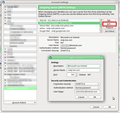
Thunderbird is trying to send from an email that is not set-up in Thunderbird
Hi guys, I posted this a few months ago https://support.mozilla.org/en-US/questions/1005652 I recently came across a hidden problem related to that. I was inspecting an email header for unrelated troubleshooting reasons and saw my old email address in there. That old address had been creating problems for me and so I deleted it from Thunderbird. It is no longer in any way connected to Thunderbird...or so I thought. When I saw my old address in this email header I didn't understand so I deleted the account as I was no longer using it anyway. I now realise that Thunderbird has now for months been sending my emails FROM THE WRONG ADDRESS. Which is proving to be a massive problem as people are replying to that address and I'm not receiving their replies. So now that I have deleted the account Thunderbird won't let me send emails because it's trying to send emails from a google account that no longer exists.
PLEASE HELP ME FIX THIS GUYS!
所有回复 (8)
Tools menu (ALt+T) > account settings > outgoing server (SMTP) and add an outgoing server to use.
Then navigate to the account name above the outgoing server (SMTP) and ensure the SMTP server you have created is selected for that account.
It already has an outgoing server. For some reason there's two identical outgoing servers, but it's using the default. See attached image.
You don't need this old googlemail SMTP any more, right? So go to Tools|Account Settings|Outgoing Server (SMTP) and delete it.
If you have more than one googlemail account, or indeed other non-googlemail accounts, then there is no such thing as a "default SMTP server" as far as google is concerned. When you send via the googlemail SMTP service, it will use the email address associated with the SMTP set-up you use, disregarding anything in the message itself. So if you have two googlemail accounts, [email protected], and [email protected], you need two SMTP set-ups, one each for [email protected] and [email protected]. If you send from [email protected] using the [email protected] server, it will say its was sent by [email protected].
So each and every incoming googlemail email account needs its own corresponding outgoing SMTP set-up. If you use googlemail SMTP to send with other, non-googlemail, accounts then the sent messages will also appear to be from the googlemail email address associated with the SMTP set-up, UNLESS you register those "foreign" addresses in your googlemail account setting webpage.
A tip: don't let Thunderbird accept the default SMTP server name as the SMTP server identifier. Set up something distinctive. You have two SMTP set-ups for googlemail and you can't tell them apart. Each has a "description" - use this to distinguish between them.
由Zenos于
I can't work out how to delete SMTP servers and this all seems quite advanced. Would it work to just re-install Thunderbird? It wouldn't cause any problems as far as I can see and wouldn't even take that long.
No, reinstalling Thunderbird won't help one jot because your settings are stored separately, in your profile, and this isn't changed when you install the executable program. (At least that's how it's meant to happen; in practice, and ironically, many users have trouble with profiles being accidentally lost or damaged.)
Go to Tools|Account Settings and select Outgoing Server (SMTP)
Your SMTP servers will be shown in a list at the top right. You select one and remove it. You are not allowed to delete the designated default server, so if that's the one you want to delete, set another as the default.
The attached screenshot shows one selected for editing, but you can see all the relevant buttons. If you just select an smtp server, its details are shown just beneath the list, so you can browse them to help identify which does what and which needs deleting or editing.
I can't see Outgoing Server, this is what comes up when I open Account Settings
I think your profile is damaged.
I'd create a new one to see if the normal appearance is restored.
How would I go about doing that?



